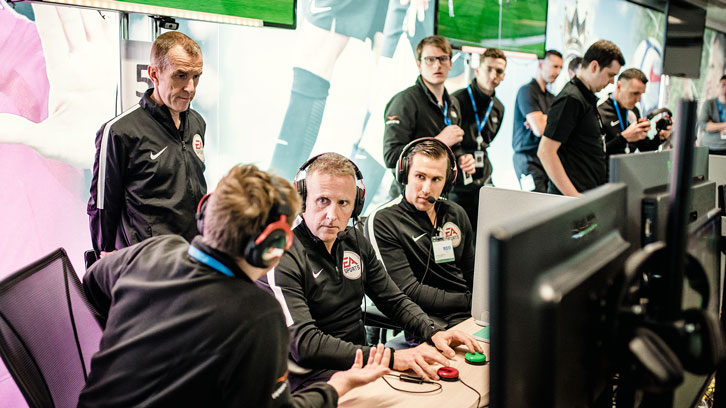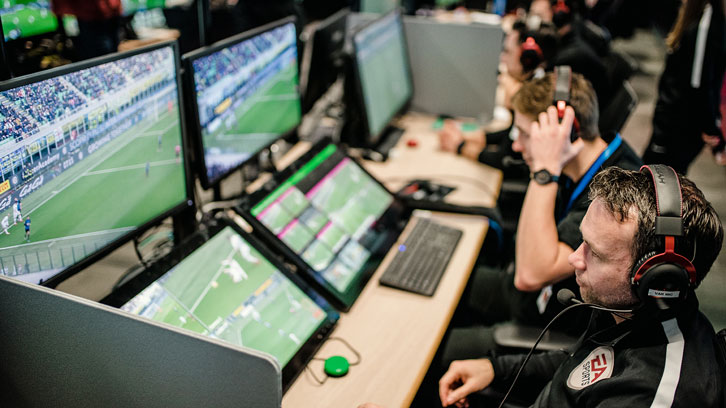For the first time ever in the Premier League, Video Assistant Referees (VAR) will be used for every match this season, with West Ham United’s fixture with Manchester City being the second game to use the system.
All 380 Premier League fixtures will have a VAR, who is constantly monitoring the match but will be used only for ‘clear and obvious errors’ or ‘serious missed incidents’ in four match-changing situations:
- Goals
- Penalty decisions
- Direct red cards
- Mistaken identity
VAR has been used at London Stadium previously, in last season’s EFL Cup ties with Macclesfield Town and Tottenham Hotspur, with Lucas Perez’s goal in the latter being awarded after a VAR consultation.
On Saturday, a video explaining how the VAR process will work will be shown on the big screens at London Stadium before kick-off, while posters outlining the new system have been put up around the ground.
The match will be watched by VAR David Coote and his assistant Stephen Child at the VAR Hub at Stockley Park, west London. There, they will have access to all pitch-facing broadcast cameras at London Stadium, some featuring slow-motion replays. There will also be additional cameras dedicated to monitoring offsides, with the option for computer-generated lines projected on to the pitch to help make a decision.
While the VAR is reviewing an incident, if play is continuing to proceed, the AVAR will monitor the match for any further incidents.
At London Stadium itself, a VAR Referee Review Area (RRA) will be set up pitchside, where referee Mike Dean will be able to view VAR incidents. A review assistant will help the referee to operate the screen, if required.
Graphics will be displayed on the big screens in the Bobby Moore and Sir Trevor Brooking Stands, to explaining a delay in play caused by VAR, or an overturned decision. Definitive video clips will also be shown for decisions overturned by VAR.

The Premier League explained that VAR will only be used when necessary, to avoid repeated and unnecessary stoppages during what are always high-paced, intense matches.
“The final decision will always be taken by the on-field referee,” the Premier League confirmed. “VAR will not achieve 100 per cent accuracy, but will positively influence decision-making and lead to more correct, and fairer, judgments.
“In the Premier League, there will be a high bar for VAR intervention on subjective decisions to maintain the pace and intensity of the matches. Factual decisions, such as offside or if a foul was committed inside or outside the penalty area, will not be subject to the ‘clear and obvious error’ test.”
In detail, this is how VAR will be used to make decisions in four match-changing situations:
Goals
All goals scored in the Premier League will automatically be checked by the Video Assistant Referee (VAR). They will check for any infringements by the attacking team in the attacking possession phase that led to the goal.
For factual decisions such as offside or the ball being out of play, the VAR will inform the referee, who will overturn any award of a goal. For subjective decisions such as a foul or a handball, VAR can be used to overturn if a “clear and obvious error” has been identified.
The referee will explain his decision to the VAR and what he has seen. If the evidence provided by the broadcast footage does not accord with what the referee believes he has seen, then the VAR can recommend an overturn. The final decision will remain with the on-field referee.

Penalties
All penalties awarded in the Premier League will automatically be checked by the Video Assistant Referee (VAR), who will also check for possible penalties not given by the on-field referee.
For penalties awarded the VAR will check for any infringements by the attacking team in the attacking possession phase that led to the penalty as well as the incident for which the penalty was awarded.
For factual decisions such as offside or the ball being out of play in the build-up, the VAR will inform the referee, who will overturn any penalty awarded. For subjective penalty decisions, such as for a foul or for a handball, the VAR will look to identify a 'clear and obvious error'. The referee will explain his decision to the VAR and what he has seen.
If the evidence provided to the VAR by the broadcast footage does not accord with what the referee believes he has seen, then the VAR can recommend an overturn. The final decision will remain with the on-field referee.
If a penalty decision is overturned with no infringement by the attacking team, play will restart with an uncontested drop ball for the defending team.
Red cards
All red cards awarded in the Premier League will automatically be checked by the Video Assistant Referee (VAR). The VAR will also check for possible red-card incidents for which the on-field referee has awarded a yellow card or no card at all.
The VAR will look to identify a 'clear and obvious error'. The on-field referee will explain his decision to the VAR and what he has seen.
If the evidence provided to the VAR by the broadcast footage does not accord with what the referee believes he has seen, then the VAR can recommend an overturn. The final decision will remain with the on-field referee.
For possible red-card incidents unseen by the match officials, the VAR has a short window to intervene. If the ball is in play, VAR has until the next re-start of play. If the ball is out of play, VAR has until the second restart of play.
For incidents not captured by the match officials or VAR, The FA’s retrospective disciplinary process remains.
The VAR will not intervene for an incident where a second yellow card leads to a red card, unless the VAR believes the second yellow card should be upgraded to a red.
Mistaken identity
In the event that the on-field referee awards a yellow or red card to the wrong player, or is unsure of the player to award it to, the VAR will advise the referee as to the correct player to be disciplined.